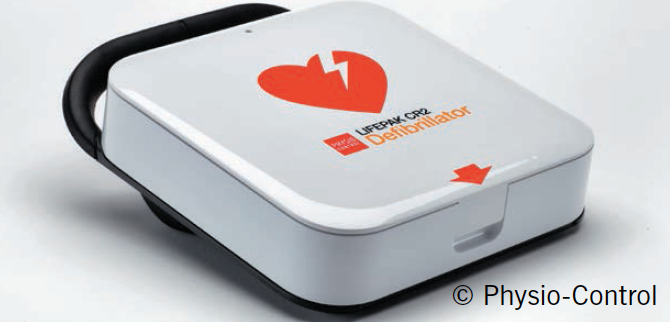New AED launched
 Physio-Control, a global leader in lifesaving emergency response technology, is launching a new automated external defibrillator (AED) in European countries (LIFEPAK® CR2).
Physio-Control, a global leader in lifesaving emergency response technology, is launching a new automated external defibrillator (AED) in European countries (LIFEPAK® CR2).
The LIFEPAK® AED Response System:
- Features a new design intended for ease of use by bystanders and rescuers
- Launches new technology that supports high quality cardiopulmonary resuscitation
- Has been demonstrated to offer faster time-to-first-shock
- Deploys a new remote monitoring and connectivity capability through the online LIFELINKcentral™ AED Program Manager. The CR2 can be remotely monitored and can even, in some areas, transmit a heart rhythm to emergency medical professionals before they arrive on the scene.
Manifesto for a ‘health-creating’ society
Brexit and the troubled state of the NHS call for re-thinking the UK’s approach to health, according to a call-to-action from clinicians, scientists, social entrepreneurs and crossbench peers published recently in The Lancet (doi: 10.1016/ S0140-6736(16)31801-3).
The EU referendum vote reveals deep social divisions as well as presenting the country with important decisions and negotiations about the future, say the authors. At the same time, health problems are growing, they argue: “the NHS faces severe financial constraints and appears to lurch from crisis to crisis, with leaving the European Union likely to exacerbate many problems including staffing issues across the whole sector”.
They review new scientific developments and digital technologies which could offer societies everywhere massive and unprecedented opportunities for improving health.
NICE recommends ticagrelor post-MI
The National Institute for Health and Care Excellence (NICE) has published a Final Appraisal Determination (FAD) recommending ticagrelor 60 mg with aspirin as an option for preventing atherothrombotic events in adults who have had myocardial infarction (MI) and who are at high risk of a further event.
“Secondary prevention for heart attack patients is critically important for their physical and psychological wellbeing,” said Professor Rob Storey (University of Sheffield). “Today’s NICE recommendation is an important step forward in enabling us as clinicians to continue reducing patients’ risk of a further atherothrombotic event, including another heart attack or stroke, in the first few years following an initial heart attack,” he added.
Medication to prevent MI linked to reduced severity
Medications prescribed to prevent myocardial infarction (MI), such as statins and aspirin, are also associated with reduced MI severity, according to research published recently in PLOS ONE (doi: 10.1371/journal.pone.0163068). The observational study in nearly 15,000 patients provides further evidence of the benefits of taking these medications.
This study assessed the relationship between prior use of four preventive medications (antiplatelet agents such as aspirin, angiotensin converting enzyme inhibitors/angiotensin receptor blockers, statins, and beta blockers) and in-hospital outcomes in patients with acute coronary syndromes (ACS).
Prior use of each medication was significantly associated with less severity of disease, less arrhythmia, and reduced risk of major adverse cardiovascular events during hospitalisation.
Semaglutide benefits – SUSTAIN-6 study
In patients with type 2 diabetes at high cardiovascular risk, the rate of cardiovascular death, nonfatal myocardial infarction, or nonfatal stroke is significantly lower among patients receiving semaglutide than among those receiving placebo, according to data from the SUSTAIN-6 study.
Patients were randomised in a 1:1:1:1 ratio to receive either 0.5 mg or 1.0 mg of once-weekly subcutaneous semaglutide or volume-matched placebo, which maintained blinding within dose. The trial consisted of a planned observation period of 109 weeks for all patients.
Statin use reviewed
A major review of the available evidence on the safety and efficacy of statin therapy, published in The Lancet (doi: 10.1016/ S0140-6736(16)31357-5), intends to help doctors, patients and the public make informed decisions about the use of the drugs. The authors warn that the benefits of statin therapy have been underestimated.
Lowering cholesterol by 2 mmol/L with an effective low-cost statin therapy (e.g. atorvastatin 40 mg daily, which costs about £2 per month in the UK) for five years in 10,000 patients would:
- Prevent major cardiovascular events in 1,000 people with pre-existing vascular disease, and in 500 people who are at increased risk but have not yet had a vascular event.
- Cause five cases of myopathy (which might progress to rhabdomyolysis, if the statin is not stopped), 5–10 haemorrhagic strokes, 50–100 new cases of diabetes and up to 50–100 cases of symptomatic adverse events.
HEART UK – The Cholesterol Charity has given its support to the review, endorsing the use of statins as safe and effective treatments for individuals with high cholesterol.
